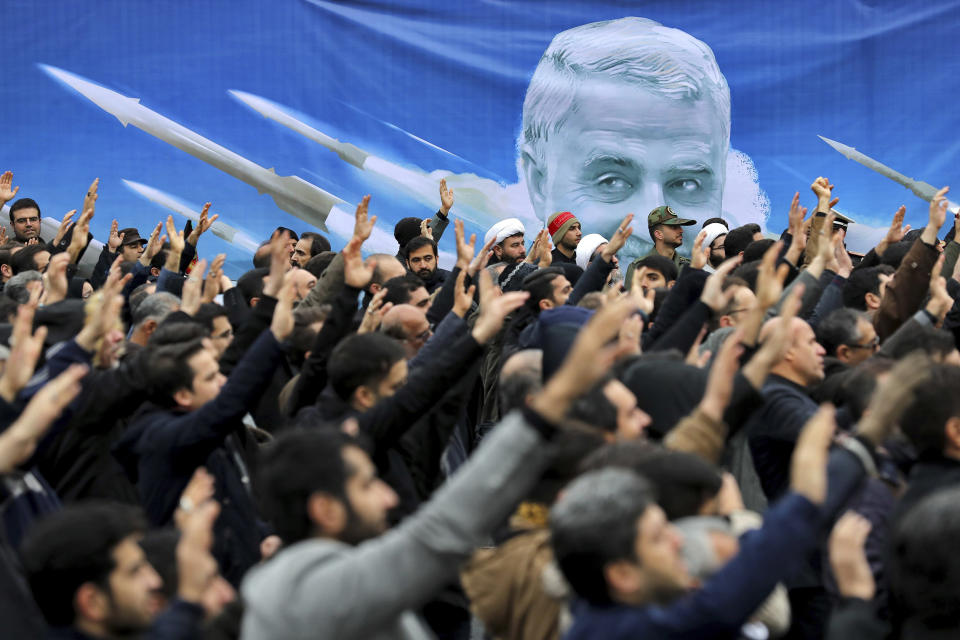Trump's bold foreign policy moves raise fear of 'destructive' final days
- Oops!Something went wrong.Please try again later.
LONDON — It's not uncommon for outgoing presidents to try to squeeze through foreign policy decisions with the final flourishes of their executive pen.
But some observers fear that President Donald Trump — disgruntled, still claiming victory — is actively attempting to tie President-elect Joe Biden's hands and shape America's international outlook for months if not years to come.
"It's pretty difficult to think over the course of 50-60 days that you can do something constructive — but you can do something that's really destructive," retired Adm. Michael Mullen, former chairman of the Joint Chiefs of Staff, recently told NBC's "Meet the Press."
Until Biden's inauguration on Jan. 20, Trump is well within his rights to use his presidential powers to push his administration's policy goals in places like Iran, Afghanistan and Iraq.
While many of Trump’s predecessors have not been shy about pursuing their agendas regardless of whether their successors agree with them, the president's moves have been far more dramatic than the norm, according to some experts.
Trump has vowed to keep ratcheting up the pressure on Iran, hitting it with a fresh volley of sanctions and reportedly having to be dissuaded from pursuing military action.
If that approach makes it harder for Biden to revive the Iran nuclear deal, some observers believe that the assassination of the Iranian nuclear scientist Mohsen Fakhrizadeh makes it more so.
Israel, long suspected of killing Iranian nuclear scientists over the last decade, has declined to comment on the attack. Like his major ally in the White House, Israeli Prime Minister Benjamin Netanyahu has vowed that the nuclear deal must never be resuscitated.
Many in foreign policy circles were already on edge, particularly after the unceremonious ouster of Defense Secretary Mark Esper and the hiring of Trump loyalists to fill top roles at the Pentagon.

Elsewhere, Trump has kept up his policy of unilaterally severing links with China by banning U.S. investment in Chinese companies with links to the People's Liberation Army. Biden has pledged to be tough on Beijing but will do so in cooperation with allies, rather than acting alone.
And the president has put in place a plan to withdraw 2,500 troops from Afghanistan and Iraq days before Biden's inauguration.
Biden says he does not disagree with this as long as there is a plan in place to combat the Islamic State militant group once those troops are gone. But other experts fear the move could further destabilize the region and rock the shaky peace deal with the Taliban.
The drawdown has been criticized even by some close allies of the president. Republican Senate Leader Mitch McConnell, R-Ky., said it would "hurt our allies and delight the people who wish us harm."
While the outgoing administration pursues goals that diverge dramatically from Biden's in the next month or so, Biden's team will also be handicapped by its unusually late start.
That's because the president-elect only received his first national security briefing last week, after Trump's belated decision to allow him access to the nation's most high-level intelligence.

Biden told NBC News' Lester Holt that the Trump administration's outreach to his transition team was "sincere." But Trump's continued instance that he won the election, not to mention his legal team's ongoing legal claims, has made some experts nervous.
"This is obviously a huge concern," said Peter Trubowitz, a professor of international relations at the London School of Economics.
"Normally, there is some communication between the outgoing and the incoming administrations, so that the incoming administration has a heads-up about what the outgoing administration thought needed to be done," he said. "That is not the kind of thinking that we see on display right now — to say the least."
Moreover, some experts say there is a risk not only from inside the White House, but among America's adversaries who may see opportunity in a distracted Washington.
Some believe North Korea could take the opportunity to launch a new missile or conduct a nuclear test. Or that China might test U.S. resolve by increasing military and economic pressure on Taiwan, the self-governed island that Beijing claims as its own province.

Not everyone is so concerned about Trump's interregnum.
"Sometimes I feel like I'm the only one with a memory longer than four years," said Salvatore Babones, an American associate professor in political sociology at the University of Sydney in Australia.
He argues that we don't have to go back too far to find a president who pushed through a flurry of last-minute actions, simultaneously bolstering his legacy and hampering his successor.
During his final weeks in office, President Barack Obama removed decadeslong preferential privileges for Cuban immigrants, announced sanctions on senior Syrian officials for suspected chemical weapons attacks, accelerated hiring to federal agencies, and commuted the prison sentence of WikiLeaks whistleblower Chelsea Manning.
"I think it's pretty ordinary, the tying up of loose ends, the attempts to get your people into office and the inevitable pardons," Babones said. "I think we should see this like many other things in the Trump administration: distinctive in style but pretty ordinary in substance."

